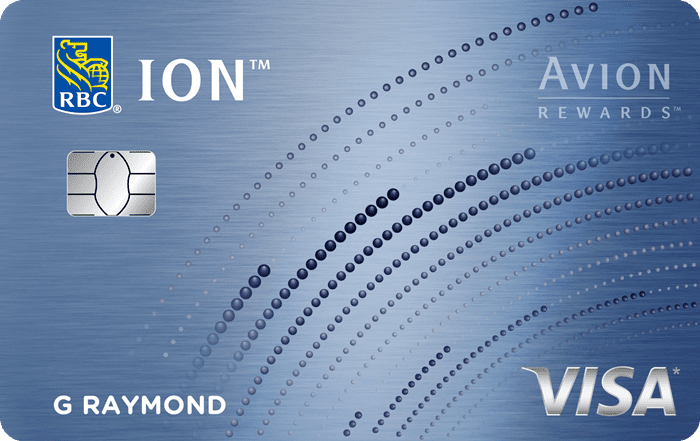Quick overview
Put it this way – The RBC ION Visa Card is about as entry-level as it gets, and swims in a sea of competitive entry-level cards (including others offered by RBC). It’s a no-annual-fee rewards credit card that offers up to 1.5 Avion points per dollar spent on everyday purchases, and you can redeem your Avion points to pay bills, pay down your credit card balance or send money via Interac e-Transfer. There’s a catch to those points though, but we’ll talk about that in a minute. The minimum redemption is only $10, which is nice for folks that aren’t big on point collecting and want to use them ASAP.
The RBC ION Visa is technically a points card. Other perks include saving 3¢/L on fuel and earning 50 Be Well points for every $1 spent on eligible purchases at Rexall when you pay with your RBC card and scan your Be Well card. One bonus that might stand out for those fond of delivery is a three-month complimentary Doordash DashPass subscription, which tacks on another $30 in value.
Remember that catch I promised? Here it is – The RBC ION Visa collects Avion points in the ION tier which are a whopping 50% less valuable than traditional Avion points. You can redeem Avion points at a rate of 100 points per $1.00 (minimum 1,000 points), whereas 100 ION points are worth $0.58 (and you must redeem a minimum of 2,500 points). So Avion collectors looking to get a free card to tack on a few bonus welcome points might be sorely disappointed at the value this card actually offers.
Who’s this card for?
That’s a tough question. I suppose there’s a card for everyone, but the RBC ION Visa operates in a weird spot. It’s a points card, but the points are so few and the bonus so little, it’s not like they’ll really ever amount to serious travel or major redemptions. But it markets itself against the entry-level, cash back cohort, many of which quite literally offer far more in real value than the RBC ION offers in points.
In effect, it targets those who want to earn rewards on everyday purchases like groceries, rides, gas, streaming, subscriptions, digital gaming, etc. It’s clearly for subscription fans and younger spenders, and offers bonuses like DoorDash subscriptions to pique the interest of this demographic.
With the ability to redeem points and pay off your card with as little as $10 collected, I think it’s safe to say the RBC ION Visa is aimed at short-term planners who don’t want to think too much about point collection and like a few of the bonus perks strapped to the card.
Pros and cons
Pros
-
No annual fee
-
Minimum redemption is only $10
-
DoorDash subscription worth $30
Cons
-
Miserly welcome bonus, valued at less than many cash back bonuses
-
Collects Avion ION points which are worth about half as much as traditional Avion points
-
Pretty “meh” on points collection through daily spending
Welcome bonus
- Get 6,000 Avion points upon approval* - that’s $40 of value in gift cards+. Apply by November 4, 2024.
How to earn points
- Earn 1.5 Avion points for every $1 spent on groceries, transportation (gas, rideshare, transit, EV charging), and streaming services and subscriptions.
- Earn 1 Avion point for every $1 spent on all other qualifying purchases.
- Earn Petro-Points when you pay for qualifying purchases with your linked RBC card at Petro-Canada locations. You can redeem your Petro-Points at Petro-Canada using your linked RBC Card.
- Note: Avion points are calculated at 100 points for $1 in savings. With ION cards, you’ll need 172 points for $1 (a point value of $0.58 cents per point). No maximum limit mentioned for earning points.
How to redeem points
While technically possible to redeem your Avion ION points for travel, it’s important to remember this card is totally insufficient for travel redemptions. Technically, you can redeem your Avion points for flights, hotels, car rentals, vacation packages and associated taxes and fees through the Avion Travel Rewards Centre, but the dedication and time you’d have to dedicate to collect sufficient points for even short-term travel makes this a bit far-fetched.
Merchandise makes slightly more sense than travel, but not by much. You can redeem your Avion points for merchandise such as electronics, home goods, fashion and more through the Avion Merchandise Rewards Centre.
Gift cards and paying off your card seems to be the best way to use your Avion ION points (and RBC knows it, with their $25 value calculated in gift card). Plus the minimum $10 redemption means you can pay off that cheeky pint you regretted springing for quickly and guilt free.
Key benefits
- No annual fee – that’s nice, right?
- Tolerable rewards for everyday spending
- Low minimum redemption amount
Insurance coverage
- Purchase security: Protection against loss, theft and damage for 90 days.
- Extended warranty: Doubles the manufacturer's warranty, up to an additional year.
- Mobile device insurance: Up to $1,000 coverage for damage, theft and loss.
Extra benefits
- Earn 50 Be Well points per dollar at Rexall with linked RBC ION+ Card.
- Complimentary three-month DashPass subscription from DoorDash.
- Save $0.03 per litre on fuel and earn 20% more Petro-Points and Avion Points
What people have to say about this card
“The RBC ION card isn't that great as the points are worth at max 0.58 cpp unless you do a conversion to WestJet Dollars.
What exactly are you looking for in a card aside from no annual fees? If you want a no annual fee travel card, look at the Scotiabank AMEX (red card). If you want a cash back card, look to the Tangerine MasterCard, Simplii Visa or AMEX SimplyCash.”
I think /u/deltatux nails it here. The points aren’t that great, and if you’re looking to convert them to WestJet Dollars (aka, you’re a travel fan) there are better point card options that you can tap into with the same good credit score you need to be considered for the RBC ion Visa.
More than that, no annual fee cards are a dime a dozen! And the beautiful thing about cold, hard, cashback cards is that if you make them your daily spender, it’s pretty easy to earn more in real value (as in actual money) than the nerfed points offered by the RBC ion.
How the card compares
RBC ION Visa Card vs. RBC Cash Back Mastercard
Well, putting these two head to head is really an arm wrestle between weaklings.The RBC Cash Back Mastercard is a low-tier cash back card that offers limited cash back on daily spending, often lower than many competitor cash back cards. The card offers 2% cash back on groceries and up to 1% cash back on all other purchases. Mercifully, it has no annual fee.
The ION Visa Card doesn’t exactly trump it in value, but honestly with the perks considered, it may actually be the superior card. I’d say if you’re not really into the points thing, shop around for a different cash back card as the RBC Cash Back Mastercard falls short in just about every way.
RBC ION Visa Card vs. RBC Avion Visa Card
Hello fellow travellers, now we’re talking – this is a card I’ve had and would recommend. The RBC Avion Visa Infinite Card is pretty darn decent for those who want to earn travel rewards. The card offers 1.00 Avion point per $1 spent on purchases and a generous welcome offer.
This card really defies comparison with the RBC ION Visa Card. First, it’s got a $120 annual fee, totally worth it for the points, but probably a bit steep if you’ve even seriously considered the ION Visa. Plus, you need a minimum personal income of $60,000 for the Avion Visa Infinite, which squarely rules out the students the ION Visa is targeting.
Now for some inside baseball – the Avion Visa is relatively easy to churn. In fact, I applied to both the Avion Visa and a lower tiered card back to back, and RBC automatically upgraded my application to a SECOND Avion Visa – which means I was able to double dip on the welcome bonus while running both cards simultaneously (a note for the travel heads).
RBC ION vs RBC ION+
| Features | RBC ION | RBC ION+ |
|---|---|---|
| Annual fee | $0 | $48 |
| Welcome offer | Get 6,000 Avion points upon approval* - that’s $40 of value in gift cards+! Apply by November 4, 2024. | Get 12,000 Avion points upon approval* - that’s $80 of value in gift cards+! Apply by November 4, 2024. |
| Insurance | Mobile device, purchase security, extended warranty | Mobile device, purchase security, extended warranty |
| Benefits | DashPass subscription, Petro Points, BeWell points at Rexall | DashPass subscription, Petro Points, BeWell points at Rexall |
Is the RBC ION Visa Card worth it?
Is it worth $0 for the annual fee? Still no, because your money could earn you more spent through other cards. Quite literally – the value you’re pulling in on this card (if spent on regularly) would be less than the cold hard cash you could pull in on decent cash back cards.
I’m not sure who exactly would want this card specifically, but if for some reason you were an RBC Avion diehard and wanted to collect ‘em all, paying no fee on this card makes it incredibly unintimidating. There’s just a veritable buffet of better options out there.
Refer to RBC page for up to date offer terms and conditions.
This post contains affiliate links. Please read disclaimer for more info.
Disclaimer: Money.ca may engage in affiliate marketing, which is done by embedding tracking links into Money.ca. If you click on a link for an affiliate partnership, a cookie will be placed on your browser to track any sales for purposes of commissions.
FAQs

Cam is a content marketer with a passion for saving, financial independence, and pulling off elaborate credit card point schemes. He has worked in Fintech and Finserve (specifically Group Retirement) and loves researching and writing about finance.
Compare other RBC credit cards
Compare other RBC credit cards
Compare other Visa credit cards
Compare other Visa credit cards
Compare other reward credit cards
Disclaimer
The content provided on Money.ca is information to help users become financially literate. It is neither tax nor legal advice, is not intended to be relied upon as a forecast, research or investment advice, and is not a recommendation, offer or solicitation to buy or sell any securities or to adopt any investment strategy. Tax, investment and all other decisions should be made, as appropriate, only with guidance from a qualified professional. We make no representation or warranty of any kind, either express or implied, with respect to the data provided, the timeliness thereof, the results to be obtained by the use thereof or any other matter. Advertisers are not responsible for the content of this site, including any editorials or reviews that may appear on this site. For complete and current information on any advertiser product, please visit their website.






